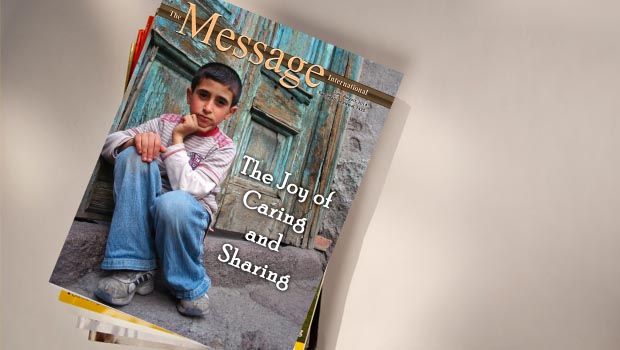Muslims everywhere—young and old, weak and strong, materially well-off or not—observe fasting in the month of Ramadan, striving for greater discipline, deeper faith, and increased compassion and generosity. Charitableness is not supposed to be confined to the month of Ramadan, however, as caring and sharing should be part of a Muslim’s personality and they should exemplify this throughout the year, in all aspects of daily living. As the Qur’an declares: “You cannot attain to righteousness unless you spend out of what you love” (Al-Quran, 3:92). Prophet Muhammad (peace be upon him) has said: “It’s better to give than to receive.” Through fasting, Muslims learn how to practice self-discipline, delay gratification, and sacrifice for the sake of Allah (swt) and the good He enjoins. During Ramadan, Muslims are reminded to be kind, considerate, and compassionate toward fellow human beings.
Caring and sharing should be part of a Muslim’s personality and they should exemplify this throughout the year, in all aspects
of daily living
One may ask why the Islamic teachings so strongly emphasize giving. We might even ask why one should care about others. In fact, helping people in need is an innate inclination of the human conscience. As such, charity has been a defining characteristic of all revealed religions; and Islam, like other faiths, distinctly links the trait of piety, a pivotal goal of religiosity, with the compassion and call to action of charitableness. It is extremely important for us to realize that the misfortunes that befall people in this world are due to a myriad of reasons: government policies, economic exploitation, corruption, poverty, famine, drought, disease and illness, personal irresponsibility, and so on. Human life is unpredictable and ever vulnerable and nobody is immune from adversity. Even when someone faces an unfortunate situation due to his or her own mistakes, that doesn’t mean the person should be ignored or disregarded without sympathy. We must extend our benevolence and helping hand toward any suffering individual.
Many verses in the Quran underscore the profound merit of charity: “Those who spend their wealth by night and day, in secret and in public, shall have their reward with their Lord. On them shall be no fear nor shall they grieve [in the hereafter]” (Al-Quran, 2:274). “And be steadfast in your prayer and pay charity; whatever good you send forth for your future, you shall find it with Allah, for Allah is well aware of what you do” (Al-Quran, 2:110). “The likeness of those who spend their wealth for Allah’s sake, is as the likeness of a grain [of corn], it grows seven ears, every single ear has a hundred grains, and Allah multiplies [increases the reward] for whom He wills, and Allah is All-Sufficient for His creatures’ needs, All-Knower” (Al-Quran, 2: 261). “Whoever works righteousness, whether a male or a female, while he [or she] is a true believer, verily to him We will give a good life [in this world], and We shall pay them certainly a reward in proportion to the best of what they used to do” (Al-Quran, 16: 97).
Showing mercy to those in straitened financial circumstances and granting them a respite until they have enough to repay their debt, or forgoing the amount in view of a borrower’s hardship, is such an extremely praiseworthy act that Allah (swt) has specifically mentioned this in the Quran: “If the debtor is in a difficulty, grant him time till it is easy for him to repay. But if you remit it by way of charity, that is best for you if you only knew” (Al-Quran, 2:280).
Since Allah (swt) has praised those who make a constant allocation in their wealth for the poor and has promised them multiplied rewards for their charity, we should be happily doing this and encourage others to do so. Allah (swt) further tells us in the Quran: “Who is he that will loan to Allah a beautiful loan which Allah will double unto his credit and multiply it many times?” (Al-Quran, 2: 245). These verses put extra emphasis on the importance of this issue and show that it is foundational in the development and realization of faith, a part of which is to acknowledge the needs of our brothers and sisters in faith as well as all of humanity.
We know that when the Prophet Muhammad (peace be upon him) first received Divine Revelation, he was in a state of bewilderment. He returned home and asked his wife to cover him up in a blanket or bed-covering and explained what had happened to him. Her response was quick and profoundly reassuring: “Allah will never disgrace you. You unite family relations, you bear the burden of the weak, you help the poor and the needy, you entertain the guests and endure hardships in the path of truthfulness.” We should note that Khadijah’s (may Allah be pleased with her) description of her blessed husband revolved around his altruism, compassion, and generosity toward others. According to an authentic hadith, Abu Hurayrah (may Allah be pleased with him) has narrated that Prophet Muhammad (pbuh) said, “The one who removes the suffering of a believer from the sufferings of this world, Allah will relieve him from his suffering on the Day of Resurrection. And the one who paves the way for someone who is insolvent, Allah will make things easy for him in the Hereafter…..” (Muslim: 38/2699). This truly exemplifies what Islam teaches us about caring and sharing in our relations with others! May Allah (swt) enable us to understand and practice these golden teachings of Islam.






